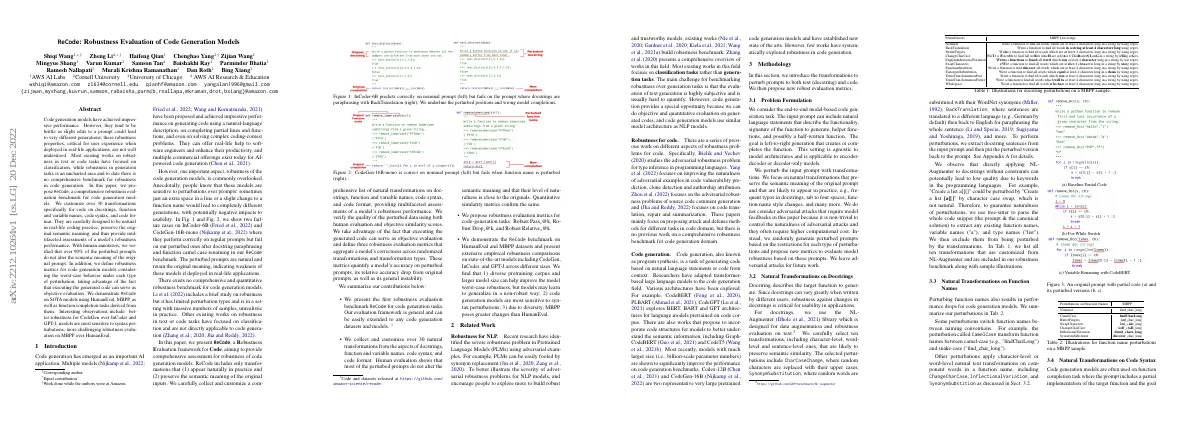Link to paper
The full paper is available here.
You can also find the paper on PapersWithCode here.
Abstract
- Code generation models have achieved impressive performance, but tend to be brittle.
- Robustness in code generation tasks is an uncharted area and there is no comprehensive benchmark for robustness.
- ReCode is a comprehensive robustness evaluation benchmark for code generation models.
- ReCode includes over 30 transformations specifically for code.
- ReCode takes advantage of the fact that executing the generated code can serve as objective evaluation.
- Observations include better robustness for CodeGen over InCoder and GPT-J, models being most sensitive to syntax perturbations, and more challenging robustness evaluation on MBPP over HumanEval.
Paper Content
Introduction
- Code generation is an important AI application
- Multiple models have been proposed and achieved impressive performance
- These models can help software engineers and enhance their productivity
- Robustness of code generation models is commonly overlooked
- Perturbations to prompts can lead to different generations with negative impacts
- There is no comprehensive and quantitative robustness benchmark for code generation models
- ReCode is a Robustness Evaluation framework for Code
- ReCode includes natural transformations that preserve the original meaning
- ReCode includes human evaluation and objective similarity scores
- ReCode proposes robustness evaluation metrics for code-generation tasks
Related work
- PLMs can be easily fooled by synonym replacement
- Code generation is a task of generating code based on natural language statements or code from context
- Researchers have adapted transformer-based large language models to the code generation field
- Few works have systematically explored robustness in code generation
Methodology
- Introduce transformations to perturb prompts
- Propose new robust evaluation metrics
Problem formulation
- End-to-end model-based code generation task
- Input prompt includes natural language statements, function signature, helper functions, and half-written function
- Goal is left-to-right generation of function
- Perturb input prompt with natural transformations that preserve semantic meaning
- Do not consider adversarial attacks in this paper
Natural transformations on docstrings
- Robustness against changes in docstrings is critical for usability in applications
- NL-Augmenter library is used for data augmentation and robustness evaluation on text
- Ten transformations are selected to preserve semantic similarity
- Transformations include character-level, word-level and sentence-level ones
- Tree-sitter is used to parse code snippet and exclude certain words from being perturbed
Natural transformations on code syntax
- Code generation models are used to complete functions given a partial implementation.
- Datasets are derived from HumanEval and MBPP by adding half of the canonical solutions to the prompts.
- Code transformations must be syntactically correct and must not alter semantic meaning.
- Three code refactoring transformations are adopted from Nat-Gen.
- Three different schemes of variable renaming are implemented.
Natural transformations on code format
- Perturbing partial code can be done by code format transformations
- ReCode implements 3 methods of new line insertions
- ReCode randomly replaces any space indent with tab or replaces tab with 4 spaces
- ReCode adds first k/2 lines given a k-line canonical solution
- ReCode selects the longest line of code and splits it into two lines in the middle
- ReCode converts docstrings to comments
Evaluation metrics
- Proposed transformations are randomized operations
- Measure model robustness over multiple samples to reduce variance
- Create s randomly perturbed prompts for each transformation and prompt
- Measure worst-case performance across each group of s perturbed prompts
- Three new metrics for robustness evaluation: RP s @k, RD s @k, RR s @k
- High RP s @k does not necessarily mean low RD s @k or RR s @k
Evaluation
- Used Hu-manEval and MBPP to demonstrate ReCode robustness evaluation framework
- Performed comprehensive study of robustness evaluation on CodeGen, InCoder, and GPT-J
- ReCode perturbations and metrics are general and applicable to any code generation datasets and models
Code generation robustness evaluation
- Diverse pretraining corpus helps with both generalization and worst-case robustness
- Larger model size brings improvement in worst-case robustness, but may risk overfitting
- Code generation models are most sensitive to syntax perturbation
- Datasets with more variances in code style pose more challenges on model robustness
Ablation study
- Robustness metrics consider worst-case performance across s perturbed datasets.
- Performance drops start converging when large enough s is evaluated.
- Trade-off between cost and evaluation strength, recommend s = 5.
- RD@k stays stable across different k while RR@k increases with k.
Perturbation sample quality
- Human evaluation showed a 14% drop in naturalness for perturbed data
- 90% of data points were rated as exactly preserved in terms of semantics
- Sentence cosine similarity between perturbed and non-perturbed docstrings and function names was 0.93 and 0.81 respectively
- CodeBLEU scores for perturbed and nonperturbed data involving code syntax/format transformations was 0.96 and 0.97 respectively
Conclusion
- Proposed ReCode benchmark for comprehensive robustness evaluation of code generation models
- Collected and customized over 30 natural transformations under categories of docstrings, function names, code syntax, and code format perturbations
- Preserve semantic meaning after perturbations
- General worst-case robustness metrics to give unified overview of model robustness performance
- Empirically demonstrated ReCode benchmark on popular models
- Human evaluation confirms over 90% of perturbed data preserve original semantic meaning
- Sentence similarity and CodeBLEU scores support quality of perturbations in ReCode
- Aim to provide comprehensive robustness evaluation framework for any code-generation models
- Robustness evaluation metrics allow users to assess model predictions with more confidence
- Model trainers aware of potential vulnerabilities that might cause mispredictions
- Transformations on docstrings include BackTranslation, ButterFingers, ChangeCharCase, EnglishInflectionalVariation, SwapCharacters, SynonymInsertion, SynonymSubstitution, TenseTransformationPast, TenseTransformationFuture, Whitespace
- Transformations on function names include CamelCase, ButterFingers, SwapCharacters, ChangeCharCase, InflectionalVariation, SynonymSubstitution
- Transformations on code content include DeadCodeInserter, For-While Switch, OperandSwap, VarRenamerCB, VarRenamerNaive, VarRenamerRN, Tab-Indent, Line Split, Doc2Comments, NewlineRandom, NewlineAfterCode, NewlineAfterDoc
- Fleiss Kappa for annotations is 0.52, 0.36 for semantic and naturalness measurements on perturbed samples
